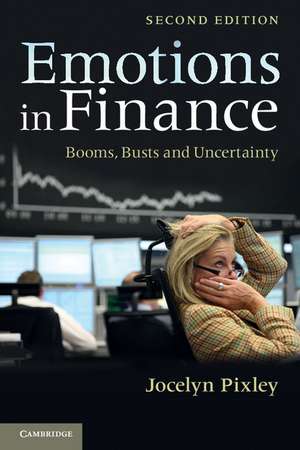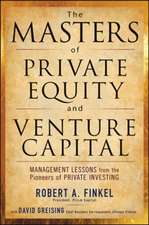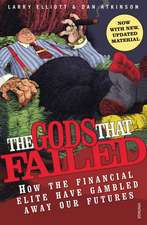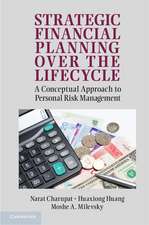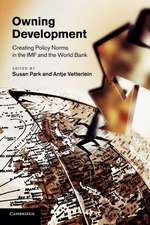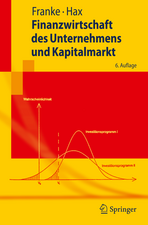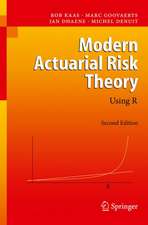Emotions in Finance: Booms, Busts and Uncertainty
Autor Jocelyn Pixleyen Limba Engleză Paperback – 16 mai 2012
| Toate formatele și edițiile | Preț | Express |
|---|---|---|
| Paperback (2) | 277.36 lei 43-57 zile | |
| Cambridge University Press – 22 noi 2004 | 277.36 lei 43-57 zile | |
| Cambridge University Press – 16 mai 2012 | 327.41 lei 43-57 zile | |
| Hardback (1) | 552.05 lei 43-57 zile | |
| Cambridge University Press – 22 noi 2004 | 552.05 lei 43-57 zile |
Preț: 327.41 lei
Nou
Puncte Express: 491
Preț estimativ în valută:
62.65€ • 65.58$ • 52.14£
62.65€ • 65.58$ • 52.14£
Carte tipărită la comandă
Livrare economică 31 martie-14 aprilie
Preluare comenzi: 021 569.72.76
Specificații
ISBN-13: 9781107633377
ISBN-10: 1107633370
Pagini: 304
Dimensiuni: 152 x 228 x 14 mm
Greutate: 0.5 kg
Ediția:Revised
Editura: Cambridge University Press
Colecția Cambridge University Press
Locul publicării:New York, United States
ISBN-10: 1107633370
Pagini: 304
Dimensiuni: 152 x 228 x 14 mm
Greutate: 0.5 kg
Ediția:Revised
Editura: Cambridge University Press
Colecția Cambridge University Press
Locul publicării:New York, United States
Cuprins
1. Modern money, modern conflicts; 2. Corporate suspicion in the kingdom of rationality; 3. Financial press as trust agencies; 4. Required distrust and the onus of a bonus; 5. Managing credibility in central banks; 6. Hierarchies of distrust from trust to bust; 7. Overwhelmed by numbers; 8. The time-utopia in finance.
Recenzii
'In the path-breaking first edition of Emotions [in] Finance, Jocelyn Pixley presciently argued three years before the crises broke in 2007 that the capitalist financial system is fragile and vulnerable. In contrast to the mistaken certainties of academic 'finance theory', she argued that the value of assets and contracts is not amenable to precise calculation - as the unresolved financial crises have once again made all too clear. In this revised edition, her fully vindicated thesis is vigorously and eloquently reasserted. The ineradicable uncertainty of the financial world can at best only be managed with the construction of impersonal trust … Acute and probing interviews with bankers, traders, journalists and other participants in the financial system provide a unique insight into this ongoing quest for trust and how - when this fails - the inevitable consequential crises are faced and interpreted.' Geoffrey Ingham, University of Cambridge
'Dr Pixley's fine book of [2005] certainly justifies the publication of this new, up-to-date edition because her original argument is further vindicated by the current troubles. She combines a deep critical analytical mind with extensive case studies and interviews to provide a unique, sustained narrative of the causes of the malfunctions in global financial markets when abuse of trust, over-fervent and unreal desires for quick and impossible-to-sustain returns dominate their workings. The author couples insights gained from the writings of pioneering sociologists, old and new, especially those of Max Weber and onwards, with the writings of the modern world's greatest monetary theorists, including Maynard Keynes.' G. C. Harcourt, University of New South Wales
'For more than a century economists have ignored the role that emotions play in the economy … this has begun to change - and Pixley's well-known book, now in an expanded and reworked 2nd edition, is part of this important turnaround. Through her empirical data, in combination with a sharp theoretical argument, Jocelyn Pixley has provided us with the best account so far of the crucial role that emotions play in finance, including the current financial crisis.' Richard Swedberg, Cornell University
'Dr Pixley's fine book of [2005] certainly justifies the publication of this new, up-to-date edition because her original argument is further vindicated by the current troubles. She combines a deep critical analytical mind with extensive case studies and interviews to provide a unique, sustained narrative of the causes of the malfunctions in global financial markets when abuse of trust, over-fervent and unreal desires for quick and impossible-to-sustain returns dominate their workings. The author couples insights gained from the writings of pioneering sociologists, old and new, especially those of Max Weber and onwards, with the writings of the modern world's greatest monetary theorists, including Maynard Keynes.' G. C. Harcourt, University of New South Wales
'For more than a century economists have ignored the role that emotions play in the economy … this has begun to change - and Pixley's well-known book, now in an expanded and reworked 2nd edition, is part of this important turnaround. Through her empirical data, in combination with a sharp theoretical argument, Jocelyn Pixley has provided us with the best account so far of the crucial role that emotions play in finance, including the current financial crisis.' Richard Swedberg, Cornell University
Notă biografică
Descriere
A unique account of how booms and busts arise from internal disputes over trust between financial corporations.
